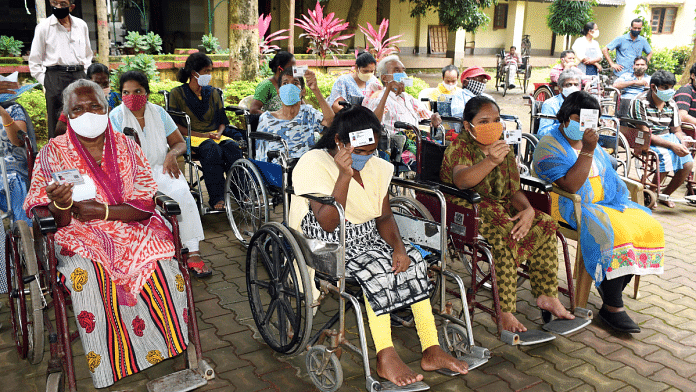New Delhi: The Draft National Policy for Persons with Disabilities 2021, which is being finalised, is likely to have a separate chapter on women with disabilities among other provisions, ThePrint has learnt. The policy, which is available on the department’s website, also focuses on special provisions for education, health facilities, employment and access to sports facilities, among other things.
This is a departure from the past and is the first time that the Department of Empowerment of Persons with Disabilities (DEPwD) under the Ministry of Social Justice is planning to specifically address challenges faced by women with disabilities. This was not mentioned in the draft national policy for persons with disabilities, which was put up for public scrutiny in June last year.
“This will ensure that more women with disabilities are able to get the benefit of various government schemes. For instance, in our scheme for providing assistance to disabled persons for purchase of aids and appliances, we have a provision that 25 per cent of the beneficiaries will be women,” Rajesh Aggarwal, secretary, DEPwD, told ThePrint last week.
“We have looked into various aspects and are planning to add a chapter on women with disabilities to ensure they get adequate attention. It is often seen that women with disabilities face a lot of issues when it comes to access to health and education,” Aggarwal added.
Confirming that the draft has been finalised, DEPwD officials said that the separate chapter is being planned following several suggestions received from various stakeholders.
“We have finalised the draft policy after incorporating all the suggestions received from the public and discussions with stakeholders. We will move proposals internally by this month-end for necessary approvals,” said the DEPwD secretary.
The activists and experts in the field ThePrint spoke have appreciated the government’s initiative, but have also raised the issue of delay in the implementation of the policy and have urged the government to fast-track the process.
The new policy will replace the existing national policy that was prepared and notified in 2006 according to the Persons with Disabilities (Equal Opportunities, Protection of Rights and Full Participation) Act of 1995.
The 1995 Act was replaced by the Rights of Persons with Disabilities Act (RPwD Act 2016), which was passed by the Parliament in 2016. While only seven disabilities were recognised in the 1995 Act, 14 new disabilities were added to the list in the RPwD Act 2016. Despite a new Act, the national policy has remained the same.
Disability rights activist Dr Anjlee Agarwal, executive director and founder of disabled people organisation Samarthyam, said a special chapter on women with disabilities and special provision for insurance for persons with disabilities should be part of the new policy.
“We had suggested to the DEPwD to have a separate chapter on women with disabilities, as they face a lot of discrimination and are marginalised,” she told ThePrint.
A majority of people with disabilities, she said, are outside the health insurance ambit.
“There are some disabilities related to only four conditions that were covered under the Niramaya scheme of the National Trust. There is a need to have a policy framework so that all people with disabilities are able to get the benefit,” she added.
Also Read: What’s missing in govt’s plan to secure ‘accessibility’ for persons with disabilities
Other provisions in draft policy
One of the key provisions in the draft policy is related to the setting up of early detection centres in all districts in the country. According to the policy, one-third of most of the disabilities in children are preventable, if detected early and with timely interventions.
The policy proposes developing a network of Cross Disability Early Intervention Centres (CDEICs) in every district to provide the following services in an accessible and appealing environment under a single roof. “…Appropriate rehabilitative interventions can reduce the disability burden and enable participation at all levels independently,” it adds.
Currently, in a large number of districts, there are none or limited number of facilities for detecting cross disabilities.
“With the RPwD Act covering 21 disabilities, of which 14 were added in the new Act, there is a need to provide a cross-disability screening facility at district level so that families of persons with disabilities don’t have to go to tertiary care centres,” said T.D. Dhariyal, former commissioner for Persons with Disabilities in Delhi.
The policy also talks about setting up a national-level employment portal for persons with disabilities. While the policy is yet to be notified, the social justice ministry launched an employment portal.
“The PM DAKSH (Dakshta Aur Kushalta Sampann Hitgrahi) DEPwD portal shall act as a comprehensive digital platform for persons with disabilities seeking skill training and employment opportunities. It offers seamless registration via Unique Disability ID (UDID), location-based skill training options, job listings from across India, and streamlined administrative processes,” the ministry said in a statement on 11 September.
The platform is a one-stop destination wherein PwDs from across the country shall have access to jobs from various companies, it added.
While experts welcome the central government’s decision to set up an employment portal, they said that the policy should be notified at the earliest.
Arman Ali, executive director, National Centre for Promotion of Employment for Disabled People (NCPEDP), told ThePrint, “The policy is needed for effective implementation of the RPwD Act of 2016. The policy guides other ministries and departments on what needs to be done or kept in mind while framing sector-specific welfare measures. It has already been delayed for a long time. The Centre should notify it at the earliest.”
According to Dhariyal, India signed the United Nations Convention on the Rights of Persons with Disabilities (UNCRPD) in October 2007 and the RPwD Act came in 2016.
“But we still have a national policy, a crucial document, which was prepared in 2006. There should be no further delay in notifying the (new) policy,” he added.
(Edited by Richa Mishra)
Also Read: Don’t drop disability questions from NFHS-6. It will create an information gap



